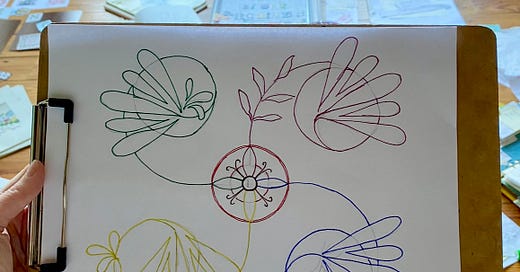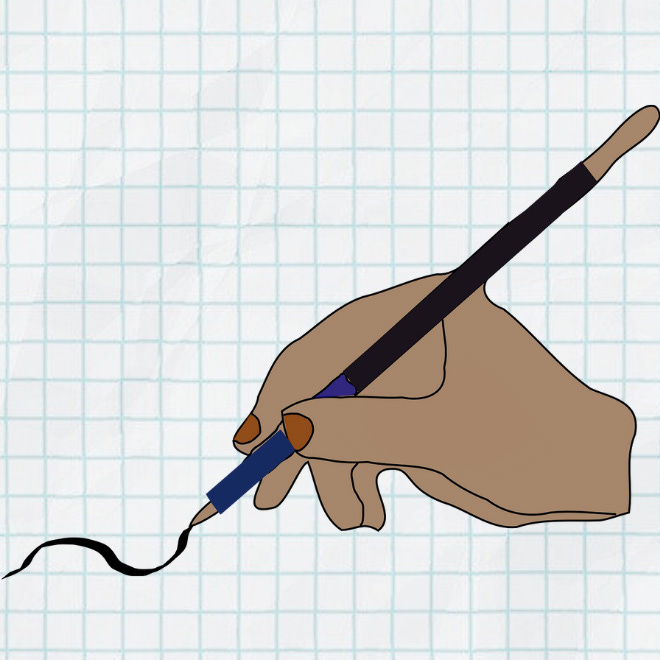Photo by Margy Thomas. Mess also by Margy Thomas.
What would Child Me do? For me, that’s one of the trustiest questions to ask myself anytime I feel truly stuck in work or in life. My Child Self knows what’s important. She knows right from wrong. She has my best interests at heart. And critically, she knows exactly how to make the kind of messes that create space for new possibilities to emerge where previously there were none.
My Child Self is responsible for all the greatest discoveries and insights that my Grown Up Self gets credit for.
How about you? See if you can remember a younger version of yourself today, and listen for the wisdom that little one has for you.
Sit quietly wherever you are right now and think back to who you were at five years old, or eleven, or thirteen, or any prior age that stands out in your memory.
How did you play when you were by yourself? Were you a fort-in-the-woods kind of child, or were you more into crafting miniature paper and cardboard worlds? What creative visions did you make real?
How did you play with other children? Did your younger self like producing backyard musicals, or running pretend secret agent missions? How did you create communities and collaborations?
How did you absorb and communicate information? Which genres of book did you devour for fun, and what topics filled the notes you passed in class? How did you experience and build worlds made out of words?
You don’t have to answer every one of those questions; just turn them over in your mind and see what memories bubble up. Here’s one question to sum up all the questions above: When the world was new to you, how did you choose to explore, invent, and make believe?
As you think back to your favorite childhood toys and pastimes, notice what threads of continuity you can trace from the activities of Younger You to your present-day life as a scholar.
Do you see similarities in the subject matter?
In the problems you’re trying to solve?
In the processes you employ?
How did play prepare you for the work that you now do?
In your childhood memories lie the earliest traces of your Story-Argument: the body of work you alone can create. The ways that you played and communicated as a child contain clues about what questions interest you, what you find intrinsically important, and how you engage with the tensions and quandaries of life.
The earlier selves inside you are among your most trustworthy guides in your scholarly work. They show you what questions are worth asking and remind you what frames of mind are most likely to yield answers.
Invite Younger You to sit down for an #AcWriMoment with you today and ask, “What questions do you think I should explore in my work? Where, and how, do you think I should look for answers?”
Then listen to what Younger You has to say. And remember, you can invite them back to talk with you again, anytime you want.
For support in cultivating your unique Story-Argument, check out the free Scholar Magic course from ScholarShape. You can also subscribe to the ScholarShape Substack, which will be launching soon.
P.S. This prompt is dedicated to the person who has been my own sure guide back to my Child Self: the baby Abraham mentioned in the prompt on Day 2. He turns 11 years old today!
Margy Thomas, creator of ScholarShape
For more scholarly writing inspiration, check out these resources from the curators of #AcWriMoments:
ScholarShape by Margy Thomas
WriteSPACE by Helen Sword








Helen Claire, a talkative little girl with a blonde ponytail and two missing front teeth, has just told me that it's time for me to stop tap tap tapping away on my computer or phone, thinking that I'll find all the answers there. Instead, she says, I should give Freddie a cuddle, then sit down on the floor with my colored paper and scissors and glue and start making something. The questions will arrive as soon as I start moving my hands, and the answers will follow.
Happy birthday to Abe!
Coming in late with my reply this time, as I’ve been celebrating my 11 (!)-year-old’s bday all day today! 🥲
I tried a “meet your inner child” guided meditation a couple years ago, where the narrator leads you through an imaginative process of meeting your inner child in a walled garden to ask what’s on their mind and what they want and need so that you can use this insight to understand who you are in the present day. The idea is that the wisdom of your inner child can help cut through the ambivalence and ambiguity of adult life to connect you with what is essentially you and essential to you.
At the culmination of this whole long mediation -- that I had thought might lead to my inner child pouring out tons of useful advice for me since I was a big talker as a child -- my inner child had only one word for me: “Adventure.”That was it. Make sure that life feels like an adventure.
This message has been so clarifying ever since, helping me let go of many things that I had felt like I “should” care about. The world is full of success metrics. But the one that will actually help me do the work that I’m here to do (and feel like it’s even worth it to try) is the question of whether it feels like an adventure. Am I taking risks? Learning new things? Feeling invested in the process as it unfolds? Outmaneuvering mortal peril every now and then? And am I narrating to myself a fascinating life story as I go along, regardless of whether anyone else ever hears it? These are the things that matter.
I still love this advice from my wise inner child. Thanks, little Margy :)